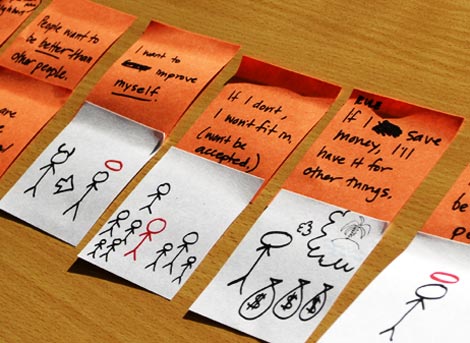(introducing behavioural heuristics)

EDIT (April 2013): An article based on the ideas in this post has now been published in the International Journal of Design – which is open-access, so it’s free to read/share. The article refines some of the ideas in this post, using elements from CarbonCulture as examples, and linking it all to concepts from human factors, cybernetics and other fields.
There are lots of models of human behaviour, and as the design of systems becomes increasingly focused on people, modelling behaviour has become more important for designers. As Jon Froehlich, Leah Findlater and James Landay note, “even if it is not explicitly recognised, designers [necessarily] approach a problem with some model of human behaviour”, and, of course, “all models are wrong, but some are useful”. One of the points of the DwI toolkit (post-rationalised) was to try to give designers a few different models of human behaviour relevant to different situations, via pattern-like examples.
I’m not going to get into what models are ‘best’ / right / most predictive for designers’ use here. There are people doing that more clearly than I can; also, there’s more to say than I have time to do at present. What I am going to talk about is an approach which has emerged out of some of the ethnographic work I’ve been doing for the Empower project, working on CarbonCulture with More Associates, where asking users questions about how and why they behaved in certain ways with technology (in particular around energy-using systems) led to answers which were resolvable into something like rules: I’m talking about behavioural heuristics.
Read More